The Bali Coffee in Jill's Bali Chronicles
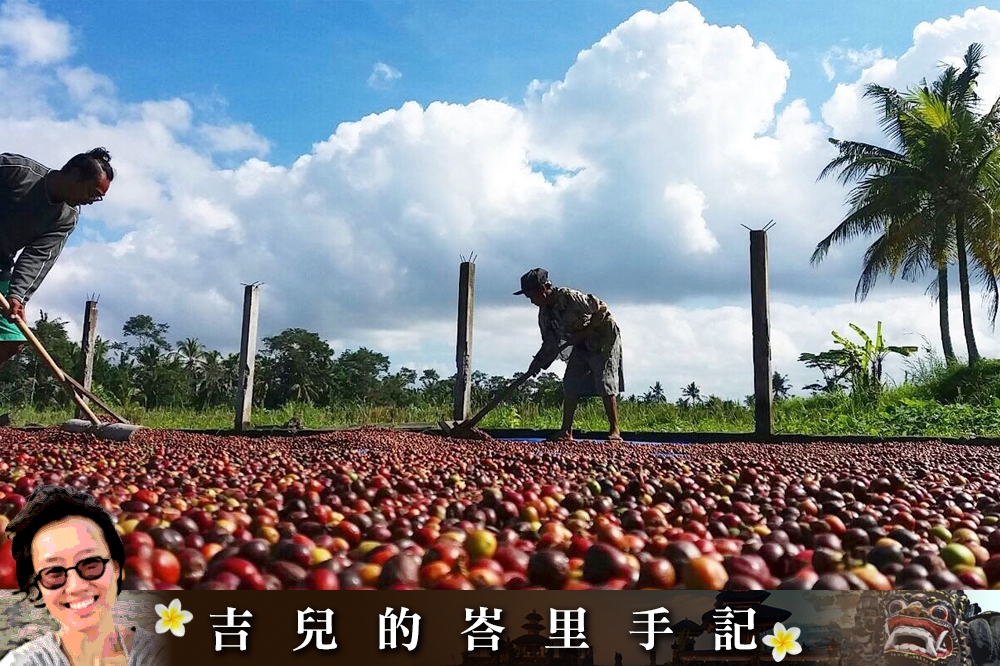
Bali sun coffee treatment in the sun. (Photo: Yang Minqi, Post-production: Pan Shiwei)
Professional barista communication, please pay attention to coffee workshop (Weixin Official Accounts cafe_style )
I slept soundly at night and was suddenly woken up by my husband. Looking at him sleepily, I know he just came back from our new cafe 2, which opened less than 2 weeks ago, and closed up with his colleagues. Tired eyes, but with a trace of excitement, I guess there is some good news.
"The American customers who visited the processing yard a few days ago tried our Bali honey processing this year and liked it very much. I hope they can order 2 containers with us next year…" Before he could finish, I almost fell out of bed. This order is more than twice the total amount we are currently handling! Coupled with the original domestic demand, it is impossible to cope with the current equipment, and there will definitely be problems.
"But this is the 'problem' we want!" Hubby hard to hide a face excited, because everything hard seems to be turning around.
Ripe Bali Kintamani coffee berries await harvest.
2017 is our third year of coffee berry processing. The coffee processing farm is a partnership between my husband and two other like-minded friends. These three coffee quality appraisers (CQI Q Grader) from Australia, Bali and Germany have the same passion for coffee.
Since we started Seniman Coffee Studio in 2010, apart from finding it difficult to import foreign raw beans into Indonesia (due to Indonesia's protection policy on local agriculture), we have gradually understood that the quality of local coffee beans must be controlled directly from coffee farmers and participate in the processing of berries such as sun drying and washing in order to get the flavor we expect.
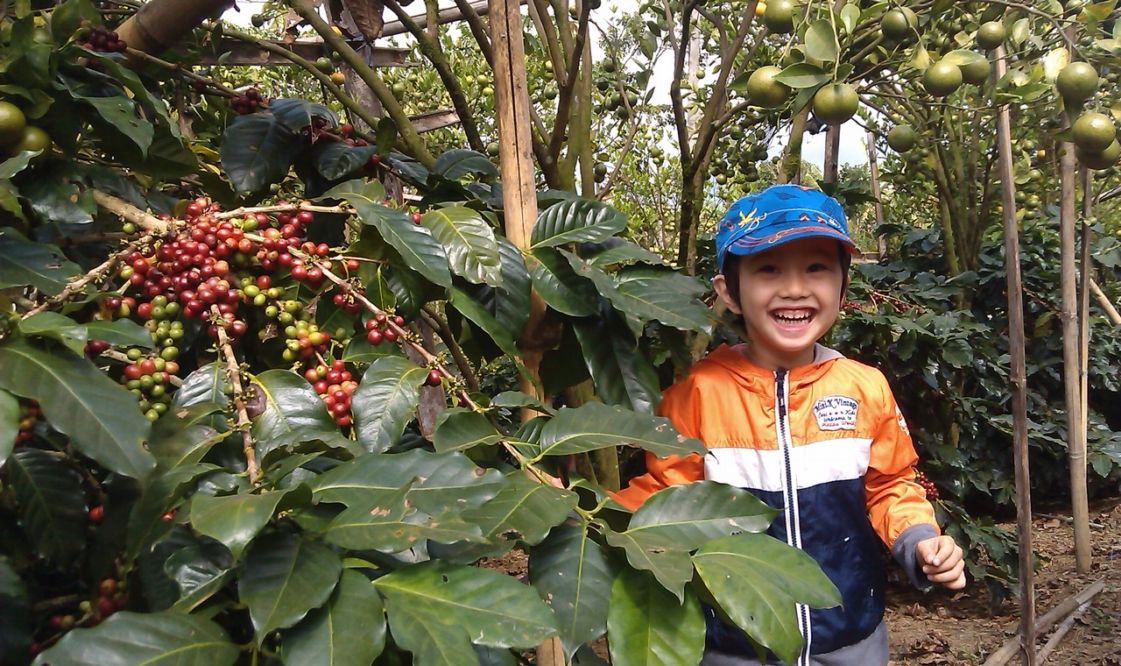
Bali Kintamani coffee trees are planted in orchards to get indirect sunlight. (Photo: Yang Minqi)
I still remember that more than 2 years ago, when I started processing coffee berries in Ubud District, rows of simple bamboo drying racks were stretched on the net and set up in the open space in front of our house. A fine coffee experiment took place in the yard. Every day or two during the harvest season, farmers bring down carloads of bright red coffee berries from the Quintamani volcanic area, wash them, float them, and put them on the rack. Thus begins the "natural process."
Before a peeling machine had been purchased, farmers helped peel some of the berries on the mountain and carried them down the mountain with some pulp and sticky coffee beans. The honey process followed suit. All season long, the yard wafts with the aroma of fermented fruit!
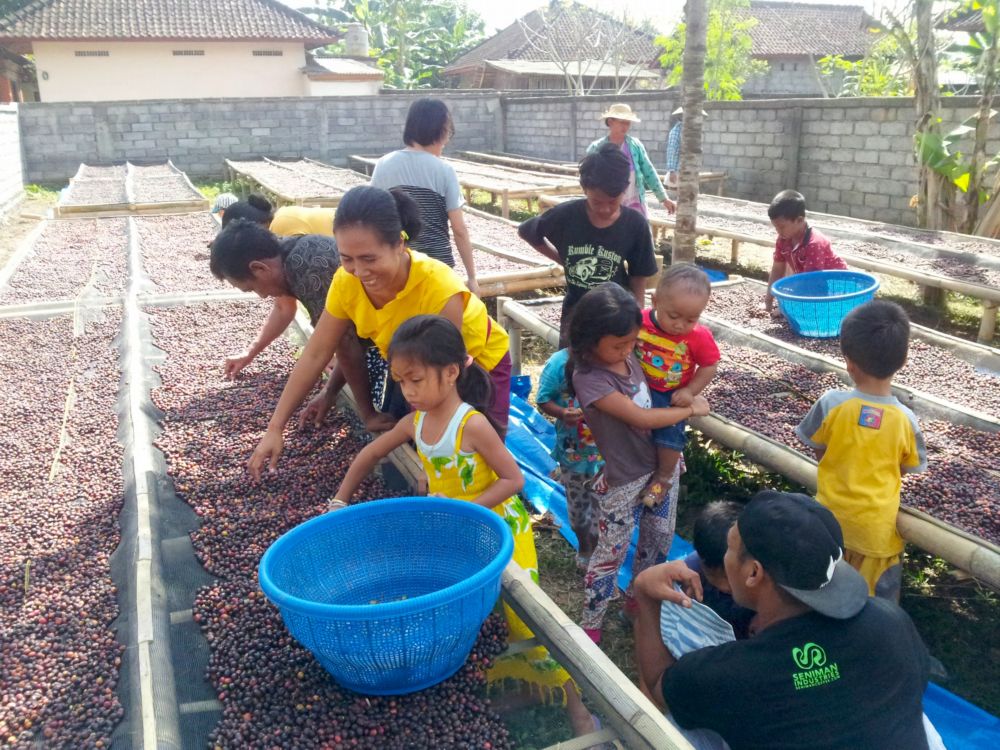
In the first year, coffee processing was carried out in their front yard, and many villagers participated enthusiastically. (Photo: Yang Minqi)
After starting coffee processing work, I can better understand the feelings of farmers "watching the sky and eating". Coffee beans need to be exposed to sufficient sunlight for a certain period of time in order to achieve the desired flavor. Although the harvest season is the dry season in Bali, due to global warming and climate change, we dare not take it lightly.
As soon as a large cloud approached, everyone covered the canvas as quickly as possible, so that a rain would not increase the humidity of the warm beans. When the sun appeared, they immediately opened the canvas and let the beans sunbathe.
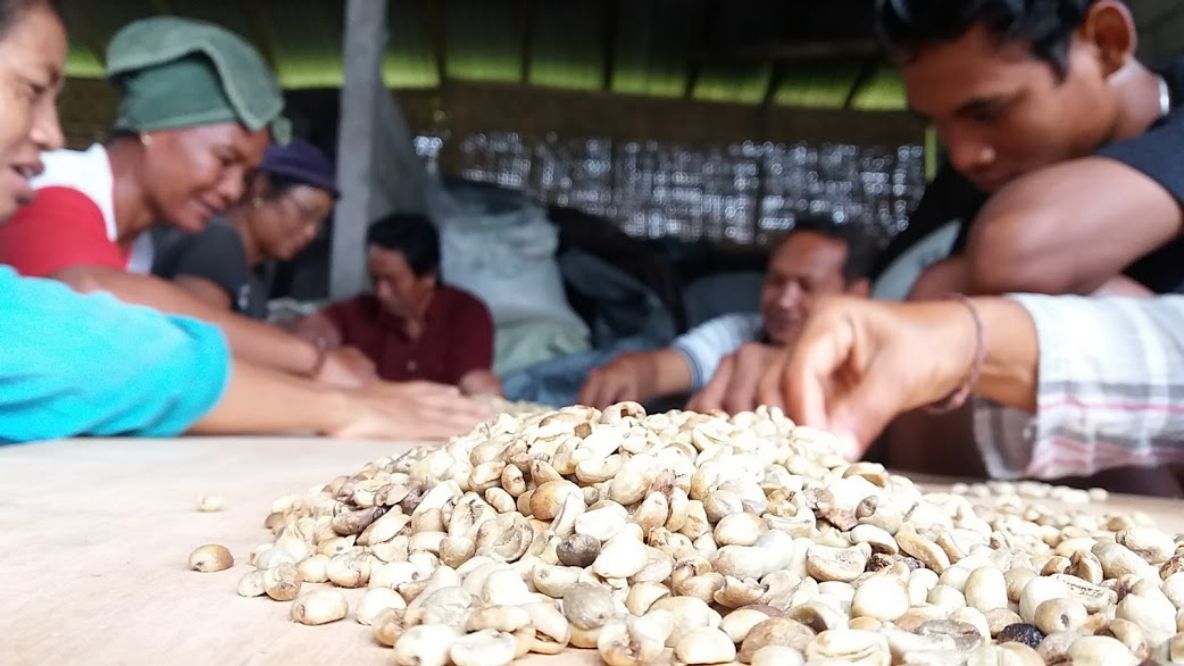
The manual selection of defective beans requires the joint efforts of many people to complete. (Photo: Yang Minqi)
Every step of the coffee industry is labour-intensive, from harvesting, washing, screening, drying, picking green beans, picking defective beans, and so on. Bali coffee beans are directly processed in the Kintamani mountains and transported to buyers. Most people outside the coffee producing areas have not touched coffee berries. Fortunately, we recruited a group of hardworking young people in the village to help, and some older villagers were attracted to join us.
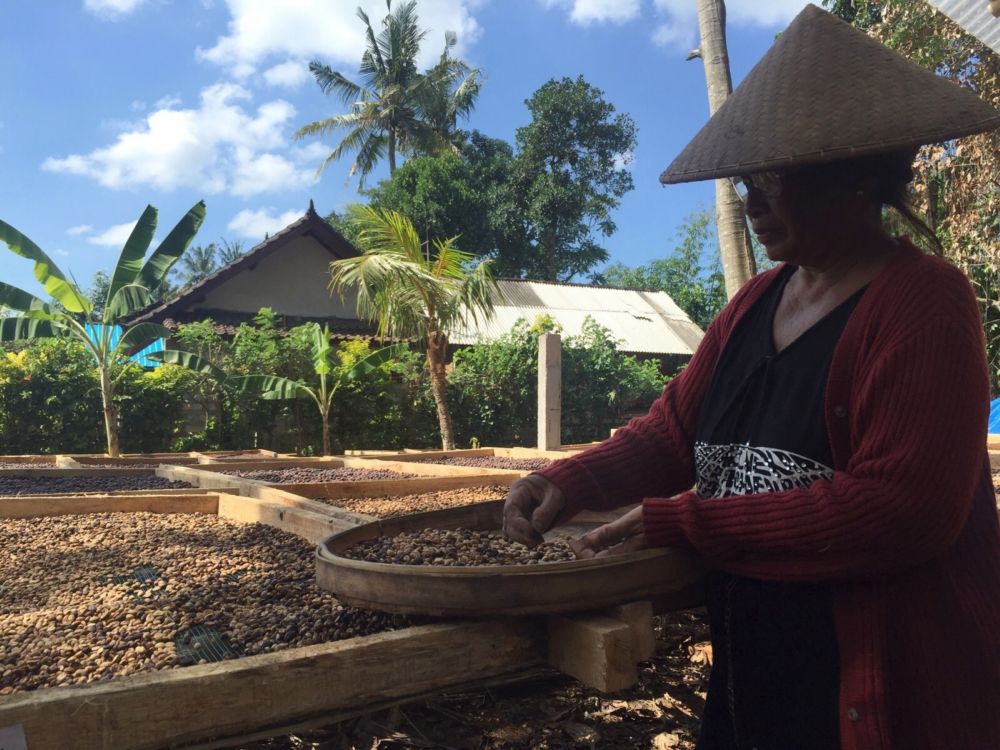
(Video: Rinsed berries enter the peeling machine, which is the pre-step of washing and honey treatment)
Indonesian coffee in the international fine coffee market, has not been as important as Central America or Africa and other places, most people's impression of Indonesian coffee is more commonly used in blending beans Robusta beans (low altitude, easy to grow, high caffeine, bitter flavor), here Arabica beans are mostly washed, but many processes are not detailed enough, quality stability is still lacking.
In fact, the quality of Indonesian coffee is not bad, and the delicacy of handling techniques is the key.
The village aunt came to assist in honey processing © Thomas Sproten
After continuous communication with coffee farmers and repeated visits to Taiwan to consult with coffee industry elders, a group of unexpected visitors arrived at the end of the first year harvest, which increased our confidence.
A coffee producing tour organized with the assistance of the Indonesian office in Taiwan invited a number of coffee professionals from Taiwan to participate. On one of their free days, they found information about our cafe on the Internet and drove over. Upon learning that we not only run a cafe but also process coffee berries, immediately expressed the desire to visit the processing plant.
This was an unexpected trip, and the colleagues were not only pleasantly surprised to discover Bali's specialty coffee processing plant, but also changed the flavor of Bali coffee after tasting. Our exquisite processing method allowed the flavor level of Bali beans to be expressed. This wonderful encounter not only gave us the opportunity to get the evaluation of many coffee professionals, but also opened the opportunity for our green beans to export, and transmitted our favorite coffee flavor to Taiwan.
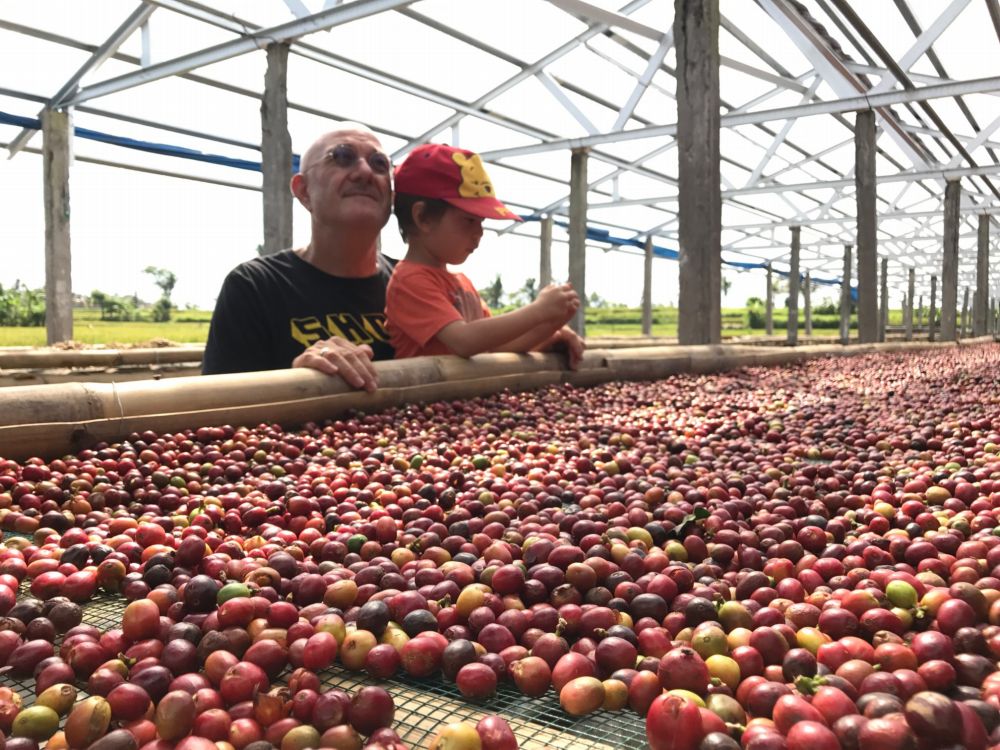
In 2017, the treatment yard was equipped with a brand new solar shed. (Photo: Yang Minqi)
With the increasing demand for specialty coffee in Indonesia and global coffee consumption, specialty coffee hunters are always looking for unique and excellent beans, eager to let everyone know Bali coffee through our efforts. Great coffee is a process.
Important Notice :
前街咖啡 FrontStreet Coffee has moved to new addredd:
FrontStreet Coffee Address: 315,Donghua East Road,GuangZhou
Tel:020 38364473
- Prev

Coconut oil coffee has been popular all year, can you really lose weight? Expert: this is the only way to be effective
Professional barista communication please follow the coffee workshop (Wechat official account cafe_style) the main component of coconut oil is medium-chain fatty acids. Its molecular length is about half of that of ordinary (long-chain fatty acids). It is a kind of saturated fatty acid that burns in the liver immediately after it is absorbed by the intestine. it is used as energy and is not easy to accumulate in the body as body fat. In addition, the intake of coconut oil
- Next

Is it true that Oakland is so poor that women steal tip cans from coffee shops in public?
Communication of professional baristas Please pay attention to the theft of the coffee workshop (Wechat official account cafe_style). After the theft, the coffee shop staff posted surveillance video clips on Facebook. As of press time, the video has been viewed by more than 20,000 netizens and shared more than 300 times. The woman quickly took the tip jar and hid it in her clothes. Source of picture: monitoring video
Related
- The ceremony is full! Starbucks starts to cut the ribbon at a complimentary coffee station?!
- A whole Michelin meal?! Lucky launches the new "Small Butter Apple Crispy Latte"
- Three tips for adjusting espresso on rainy days! Quickly find the right water temperature, powder, and grinding ratio for espresso!
- How much hot water does it take to brew hanging ear coffee? How does it taste best? Can hot water from the water dispenser be used to make ear drip coffee?
- What grade does Jamaica Blue Mountain No. 1 coffee belong to and how to drink it better? What is the highest grade of Blue Mountain coffee for coffee aristocrats?
- What are the flavor characteristics of the world-famous coffee Blue Mountain No. 1 Golden Mantelin? What are the characteristics of deep-roasted bitter coffee?
- Can I make coffee a second time in an Italian hand-brewed mocha pot? Why can't coffee be brewed several times like tea leaves?
- Hand-brewed coffee flows with a knife and a tornado. How to brew it? What is the proportion of grinding water and water temperature divided into?
- What is the difference between Indonesian Sumatra Mantinin coffee and gold Mantinin? How to distinguish between real and fake golden Mantelin coffee?
- What does bypass mean in coffee? Why can hand-brewed coffee and water make it better?

